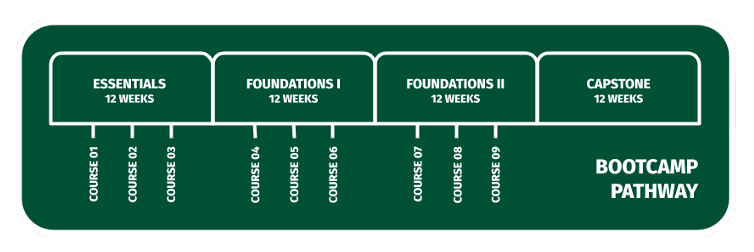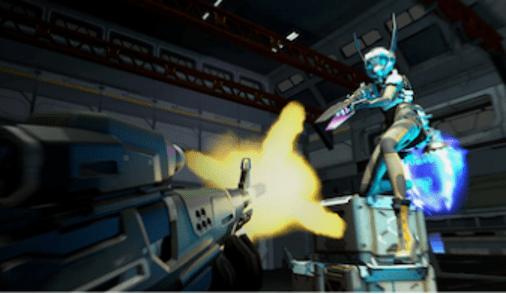Game Programming, Boot Camp
Program Overview
The UNC Charlotte Online Game Programming Boot Camp Certificate program, powered by Flatiron School, offers a comprehensive curriculum to prepare you for a career in the video game industry. Turn your passion for gaming into a profession by learning the technical skills studios demand. Develop your expertise in Unreal Engine and C++ to create dynamic, interactive gameplay systems and bring game concepts to life.
Taught by industry professionals who’ve contributed to best-selling titles, our specialized courses offer a personalized education experience tailored to your goals. As an Unreal Engine Authorized Training Center and Unreal Academic Partner, we work closely with Epic Games to deliver high-quality education, proven curricula, and real-world insights.
This comprehensive learning pathway will equip you with the skills and confidence to succeed in the exciting field of game programming.

Have questions?
Ready to make a change?
Apply NowCurriculum
Learn to program video games using Epic’s Unreal Engine.
Unreal Engine has been used to create some of the world’s most popular game titles for desktop, console, mobile, and VR/AR experiences. Using this powerful engine, you will explore C++, blueprints, UI development, input, collision, particle systems, animations, user experience, and more.
Over 48 weeks, you will gain speed and confidence in industry-leading software, learn the latest game production techniques, and graduate with a playable game to show employers.
Game Programming Essentials
Essentials of C++ – 12 Weeks
Your introduction to game programming begins with learning the fundamentals focusing on the C++ programming language. We will introduce basic C++ syntax as well as advanced techniques, and by the end of the term, you will have enough knowledge to create your first C++ game.
What you’ll learn:
- How to apply important game programming concepts used in development
- Master the basic syntax of the C++ programming language
- Create a simple C++ game from scratch using your acquired knowledge
Weekly Breakdown:
- Game Programming Concepts
- Variables and Operators
- Conditionals
- Loops
- Functions
- Classes and Objects
- Pointers, References & Dynamic Memory
- Arrays
- Inheritance & Polymorphism
- Templates
- Game Loop
- Putting It All Together
Game Programming Foundations I
Principles and Prototyping – 12 Weeks
In this program, you’ll be introduced to the Unreal Engine editor and see how the editor interacts with C++ code while building levels and gameplay elements. Blueprints will be introduced as another way to visually add logic to your games. You’ll build a simple game with input, collision, basic AI, User Interface, and audio.
What you’ll do:
- Design advanced game systems, maps, and assets
- Create a compelling game pitch
- Use the Unreal Engine to design and build games
- Whitebox a level in Unreal Engine
Weekly Breakdown:
- Core Systems
- Player Systems
- Level Design
- Implementing Gameplay
- Systems in Levels
- Whiteboxing
- Combat Systems
- Characters & Animations
- NPCs
- Advanced Level Gameplay
- Detailing Levels
- Polishing
Game Programming Foundation II
Professional Game Design and Implementation – 12 Weeks
In this program, you will tackle some more advanced uses of the Unreal Engine for a more complete picture of developing Unreal games, including character animations, particle effects, serialization, loading, and streaming levels. Finish the program by developing your own fully playable game from scratch.
What you’ll do:
- How to fully explore the Unreal animation and cinematics systems
- Understand how saving, loading, and serialization work
- Flesh out your playable game
Weekly Breakdown:
- Third Program Introduction / Project Review
- Player Interactions – Events and Delegates
- Memory Management
- Level Loading and Streaming
- Advanced Animation & Sequencer
- Introduction to AI – Behavior Trees & Blackboards
- AI Continued – perceptions
- Introduction to Networking
- Networking continued
- Advanced Debugging
- Profiling and Optimization
- Putting it All Together
Game Programming Capstone
Game Programming Capstone – 12 Weeks
This capstone is dedicated to getting you job-ready! With your instructor’s guidance, you’ll polish your best work for your portfolio and learn how to develop your competitive edge, market yourself, and make the best possible impression in front of employers. You’ll also receive additional career support, portfolio reviews, and industry insights from your career coach.
What you’ll learn:
- How to polish your portfolio to impress employers
- Interview and negotiation strategies
- Effective networking and self-promotion
- Accessing the hidden job market
In addition to your capstone project, here’s the weekly breakdown:
- Career Pathways
- Industry Overview
- Portfolio Upgrade
- Networking and Online Presence
- Resume and Cover Letter
- Job Hunting
- Freelance Work
- Interviews and Pitching
- Personal Projects and Challenges
- Working in a Studio
- Contracts and Negotiations
- Personal Roadblocks
Tuition
Upfront: $14,900
Pay as You Go: $15,900 – 12 monthly payments of $1,325
Financed Tuition: $16,500 – Monthly payments as low as $358
Have questions? Talk with a Flatiron School representative.
You should apply if…
You want to transition into the game programming industry and are looking for a fast-paced environment to gain relevant skills quickly.
You’re passionate about video games and want to uncover what makes a video game compelling and build foundations in programming game systems.
You want a hands-on education with mentorship from top game game development experts and access to the most talented programmers in the industry.
Benefits of UNC Charlotte’s partnership with Flatiron School:
- Personalized job-focused training & career services
- Small class sizes (max 5 students)
- Weekly calls with your mentor + recorded video critiques
- Supportive and active community of peers, alumni, and mentors
- Flexible schedules and 100% online, study from anywhere!

FAQ
What is Game Programming?
Game programming is the technical backbone of video game development. It involves writing the code that brings a game’s mechanics, systems, and visuals to life. Programming expertise is critical for turning creative ideas into playable, engaging, and successful games.
What Game Programming skills will I learn?
You’ll learn to deconstruct games, become fluent in Unreal Engine, and create fully playable games–all to help prepare you for the video game industry.
What types of jobs can this program prepare me for?
This boot camp will give you an excellent understanding of game programming fundamentals. Depending on your level of commitment, skills, and portfolio pieces, you may be ready to start applying for entry-level programming positions. As you grow in the field, you can prepare for jobs such as game programmer, AI programmer, and gameplay engineer.
What is the difference between Game Design and Game Programming?
The key difference between game designers and programmers is their focus: designers handle the creative aspects, while programmers tackle the technical side by writing code. Both are vital to game development, with distinct roles that occasionally overlap but remain fundamentally different disciplines.
Will I earn a certificate, credentials or academic credit when I complete the boot camp program?
This is a professional credit program. Upon completion of the boot camp, participants will receive a professional certificate and digital badge. Digital badges can be used in email signatures or digital resumes, and professional certificates can be displayed on portfolio websites and social media sites such as LinkedIn, Facebook and X.